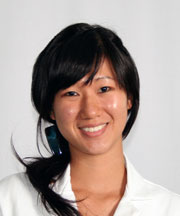The Iowa Medical Scientist Training Program (MSTP) provides training for both the M.D. and Ph.D. degrees. The dual degree program enables students to combine graduate research training with clinical studies producing physician scientists with skills and insights necessary to improve the quality of health care delivery.
Marie Kim began in the Iowa MSTP program in 2009 and has recently earned her Ph.D. in the Interdisciplinary Graduate Program in Immunology. She has been researching therapeutic vaccines that enhance T cell-mediated immunity for tumors and chronic infection.

Marie credits her decision to combine medical and research training to a longstanding, personal fascination with research.
“I have a lot of natural curiosity in doing the research about why something is the way it is,” Kim says. “There’s so much medicine to know and there’s even more to research and discover.”
Kim, who will return to complete her clinical rotations in summer 2016, readily admits that her enthusiasm for learning and research has been nurtured during her time at the University of Iowa. She enjoyed utilizing the newest research technology as much as she now anticipates acquiring specific clinical expertise.
“There are so many things we don’t understand and there are new diseases coming up that haven’t been as prevalent in the past. Advancing knowledge through research can make important contributions to the standard of care,” says Marie, who received her undergraduate degree from the University of California-Los Angeles.
As an immunology student, Kim conducts interdisciplinary research with faculty and students in pathology and microbiology. Beyond learning about the immune system in and of itself, she is applying that knowledge to other areas.
“I do pre-clinical, basic biology research,” Kim says. “If you give this kind of immunization what happens? When that happens what are you changing, and can this be reproduced every time? I want to understand what is happening in the process.”
A critical component of The University of Iowa MSTP is a strong vibrant research faculty committed to training future physician-scientists. Kim has worked closely with her mentor, Professor John Harty She credits his guidance and supervision style as a major inspiration to succeed here.
“John is really adamant about everyone being independent and having their own project. This prevents internal competition. It also lets him know who did the work,” Kim says.
Her mentor recognizes the challenge students face transitioning from diametrically opposed learning environments of medical school to research lab. In medical school students like Marie have learned to memorize and understand facts, in the lab they become independent researchers.
“In my view, the most important mentoring contribution I make for MSTP students, including Marie, is to foster their independence, such that their own interests drive the research focus of the Ph.D. “says Harty, the Mark Stinski Chair in Microbial Immunology at the UI Carver College of Medicine.
The Importance Of Service
In addition to the requirements of her clinical and research work, Marie has been actively engaged in student service. She currently is grants director for the Graduate & Professional Student Government (GPSP).
Kim is unequivocal about her belief that research, teaching, and service are essential components of professionalism and productivity.
“If you have tons of awards and publications, but no service, then you’re missing a big component of your training,” Kim says. “That’s in the professional world as well. Faculty always talk about this three-legged stool—research, teaching, and service. It’s always important to be a good citizen.
The GPSG provides grants for individual graduate and professional students enrolled at the University of Iowa. Students may use these grants for travel, or to conduct research or service projects. As grants director of the GPSP, her duties include writing the grant application instructions and scorecards, selecting grant reviewers, and recommending grant submissions for funding.
Marie’s advises graduate students to “read all the instructions on the website, read every single question thoroughly, and resubmit as many times as possible.”